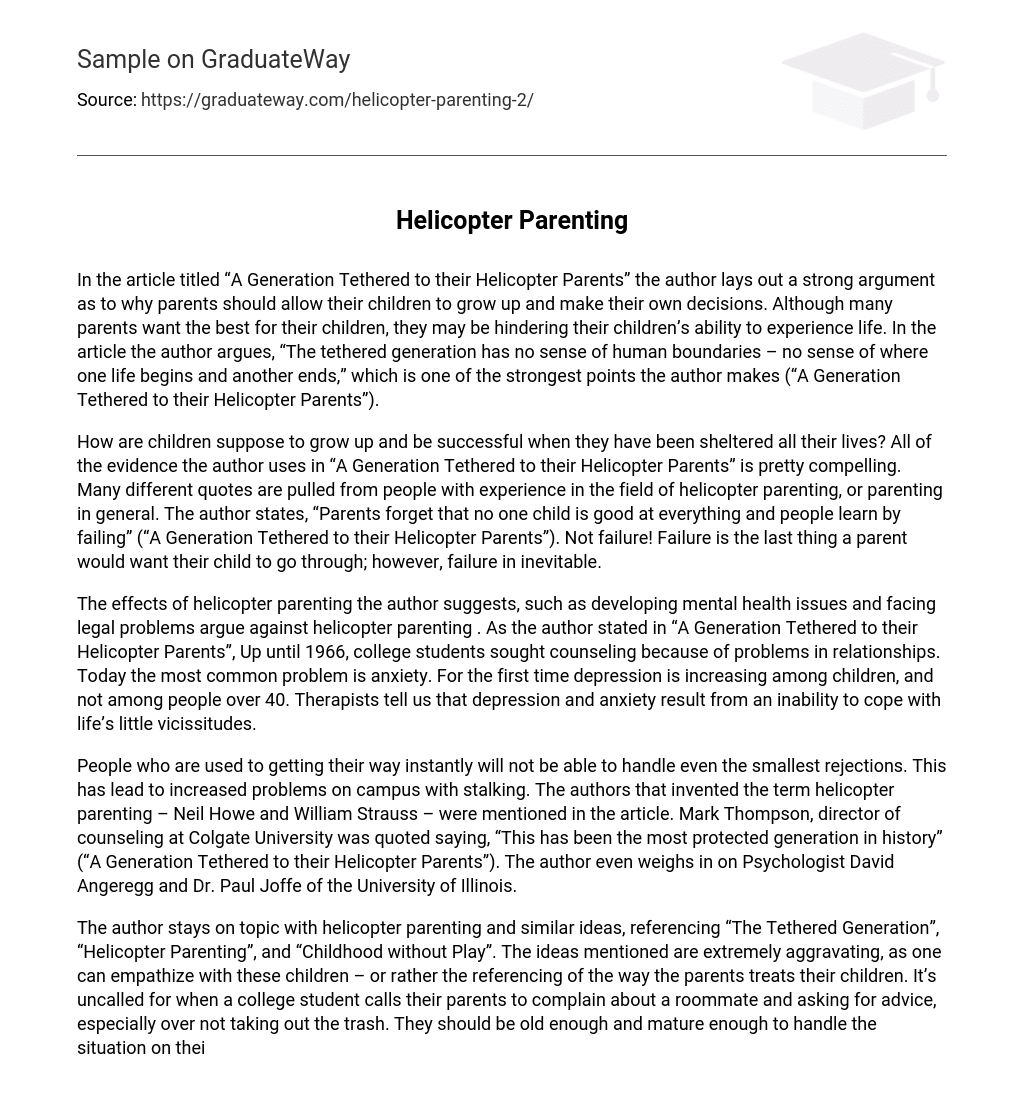In the article “A Generation Tethered to their Helicopter Parents,” the author emphasizes the importance of allowing children to develop independence by making their own choices. While parents have good intentions, their excessive involvement may impede their children’s ability to fully experience life. The author’s argument highlights that the “tethered generation” lacks an understanding of personal boundaries and fails to distinguish between their own lives and others’ lives, which is a key point (“A Generation Tethered to their Helicopter Parents”).
The text argues that children who have been sheltered all their lives struggle to grow up and succeed. The evidence provided in “A Generation Tethered to their Helicopter Parents” is convincing. The author quotes various experts in the field of helicopter parenting, highlighting the negative impact of overprotective parenting. The author emphasizes that parents often overlook the fact that no child is good at everything and that people learn from failure. Although parents avoid exposing their children to failure, it is ultimately unavoidable.
The negative consequences of helicopter parenting, as proposed by the author, include the development of mental health issues and encounters with legal problems. These findings contradict the practice of helicopter parenting. As stated in the article “A Generation Tethered to their Helicopter Parents,” counseling for college students used to primarily address relationship problems until 1966. However, anxiety has become the most prevalent problem among college students today. Additionally, depression rates are now increasing among children rather than among individuals over 40. Therapists inform us that depression and anxiety stem from an inability to effectively handle life’s everyday challenges.
According to the article, individuals with a preference for immediate gratification will struggle with even minor rejections, leading to a rise in stalking incidents on campus. The authors of the term “helicopter parenting,” Neil Howe and William Strauss, are mentioned, as well as Mark Thompson, the director of counseling at Colgate University who stated that this generation has been the most sheltered in history (“A Generation Tethered to their Helicopter Parents”). In addition, Psychologist David Angeregg and Dr. Paul Joffe from the University of Illinois are referenced by the author.
The author discusses the concept of helicopter parenting and related ideas, citing sources such as “The Tethered Generation,” “Helicopter Parenting,” and “Childhood without Play.” The ideas presented are highly frustrating, as one can empathize with the children affected by the way their parents treat them. It is unnecessary for a college student to call their parents to complain about a roommate issue or seek advice, particularly over something as trivial as not taking out the trash. At this stage in life, they should be capable and responsible enough to handle such situations independently.
The author strongly opposes helicopter parenting and criticizes parents who go to job interviews with their children. He addresses parents of the Gen Y era and future generations, highlighting the workshops colleges provide to help parents let go of their children. Despite some weak examples, like the question about dealing with a problematic roommate, the author emphasizes the need for parents to give their children independence. (“A Generation Tethered to their Helicopter Parents”)
The author is providing examples to demonstrate how children/teens are presenting things to their parents after being constantly monitored by their helicopter parents (“A Generation Tethered to their Helicopter Parents”). However, the author believes that there are more effective examples that can be used. It is clear that the teenager is complaining at this point. The inclusion of quotes and ideas from well-known individuals, as well as providing tips in workshops at schools nationwide, would add strength to the argument. Biased content is certainly apparent.
The author asserts that parents should allow children to handle their own conflicts and avoid excessive control. While it is crucial for parents to be engaged in their children’s lives and encourage their aspirations, they should also grant them independence to achieve success according to their own standards.
According to Gail Sheehy, success is attained by accumulating knowledge over time and possessing the ability to learn from mistakes independently. She emphasizes that without personal growth and change, life becomes stagnant. It is crucial to provide children with the freedom to explore their own path and experience life fully as it is fleeting.
Source: “A Generation Tethered to their Helicopter Parents: Over-Protective Child-Rearing Ruining Kids’ Lives.” Aspen Education Group. n.d. Web. 20 September 2012. http://www.aspeneducation.com/Article-helicopter-parents.html





